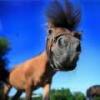All:
Yes -- exercise slows aging
"Consistent evidence has shown that exercise is able to retard the onset and impede the progression of aging by modifying mitochondrial oxidant–antioxidant homeostasis [...]"
http://www.sciencedi...095254613000288
Despite this misleading language (whether repeated in the pop press or the primary literature), it is quite clear that exercise does not slow aging, although many aspects of physiological performance and disease risk are better in exercisers than non-exercisers: because those same parameters worsen with age, there is an illusion in cross-sectional studies that exercise slows or reverses aging, when in fact the age-related decline is similar and in some indexes and studies faster in exercising vs. sedentary people or rodents. Eg,

Relation between maximal O2 uptake (VO2max) and age in endurance-trained and sedentary men. Absolute rate of decline in VO2max with age was greater in endurance-trained than in sedentary men (P < 0.001). From (1).
See also this post earlier in this thread. As you can see, the exercisers' VO2maxwas better than that of sedentary people at all ages, but the rate of age-related decline was as fast or even faster.
I want to be clear: exercise is good for you, and will delay the onset of frailty and age-related disease, particularly in your fifties through your seventies. But the fact that something is good for you doesn't mean it affects the underlying degenerative aging process.
What's sad is that when people come in to see a doctor and say they're depressed, the first thing a doctor does is point them in the direction of a pamphlet that contains various anti-depressant medications.. [...] these anti depressants rewire the reward system of your brain to where exercise is seen more as work, and less as reward.
I was surprised by the above, since anecdotally I know of a couple of people who cannot motivate themselves to exercise at all unless they're on their antidepressants. Of course, those aren't strictly incompatible. From my initial, superficial dig, it appears that although there is a mechanistic basis in serotonergic metabolism that would lead one to predict greater perceived effort of exercise after SSRI or SNRI use, the actual studies in humans are inconsistent at worst and possibly refutatory overall:
The purpose of the experiment was to examine whether selective serotonin (5-HT) re-uptake transporter blockade by paroxetine has any effect on perceived effort (RPE) during exercise or the time to reach volitional fatigue and on the prolactin and cortisol responses during prolonged exercise performed in a warm environment. Eight healthy males performed two cycle rides to exhaustion in a warm (32°C) environment at 60% of maximum oxygen uptake. Paroxetine (20 mg) or placebo was administered 5 h before exercise trials in a randomised double blind fashion. Time to exhaustion was not significantly influenced by administration of paroxetine ... RPE increased over time but was not influenced by paroxetine administration. [...] In conclusion, acute administration of paroxetine failed to alter RPE, exercise capacity or the response of the determined peripheral hormone markers of central 5-HT activity during prolonged exercise in a warm environment.(2)
Nine healthy endurance-trained males were recruited to examine the effect of a dual dopamine/noradrenaline reuptake inhibitor on performance, thermoregulation and the hormonal responses to exercise. Subjects performed four trials, ingesting either a placebo (pla) or 2 × 300 mg bupropion (bup), prior to exercise in temperate (18°C) or warm (30°C) conditions. Trials consisted of 60 min cycle exercise at 55% Wmax immediately followed by a time trial (TT). TT performance in the heat was significantly improved by bupropion (pla: 39.8 ± 3.9 min, bup: 36.4 ± 5.7 min; P = 0.046), but no difference between treatments was apparent in temperate conditions (pla: 30.6 ± 2.2 min, bup: 30.6 ± 1.9 min; P = 0.954). While TT power output was consistently lower in the heat when compared to temperate conditions, this decrement was attenuated by bupropion. ... These data indicate that performance in warm conditions is enhanced by acute administration of a dual dopamine/noradrenaline reuptake inhibitor. No such effect was apparent under temperate conditions. It appears that bupropion enabled subjects to maintain a greater TT power output in the heat with the same perception of effort and thermal stress reported during the placebo trial, despite the attainment of a higher core temperature.(3)
See detailed discussion in the intro and the "Discussion" section of (2).
References
1: Pimentel AE, Gentile CL, Tanaka H, Seals DR, Gates PE. Greater rate of decline in maximal aerobic capacity with age in endurance-trained than in sedentary men. J Appl Physiol (1985). 2003 Jun;94(6):2406-13. Epub 2003 Jan 17. PubMed PMID: 12533496.
2: Strachan AT, Leiper JB, Maughan RJ. Paroxetine administration failed [corrected] to influence human exercise capacity, perceived effort or hormone responses during prolonged exercise in a warm environment. Exp Physiol. 2004 Nov;89(6):657-64. Epub 2004 Aug 24. Erratum in: Exp Physiol. 2005 Jan;90(1):151. PubMed PMID: 15328306.
3: Watson P, Hasegawa H, Roelands B, Piacentini MF, Looverie R, Meeusen R. Acute dopamine/noradrenaline reuptake inhibition enhances human exercise performance in warm, but not temperate conditions. J Physiol. 2005 Jun 15;565(Pt 3):873-83. Epub 2005 Apr 14. PubMed PMID: 15831540; PubMed Central PMCID: PMC1464564.
































































